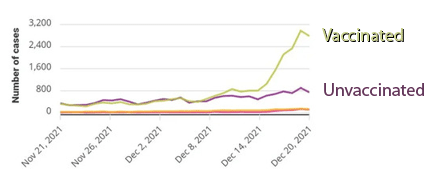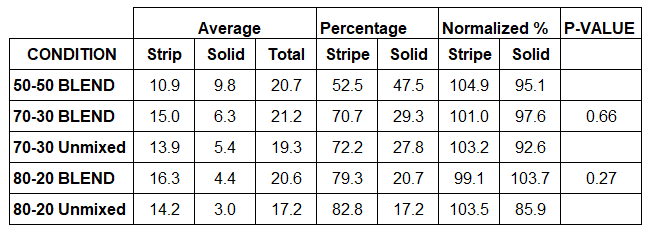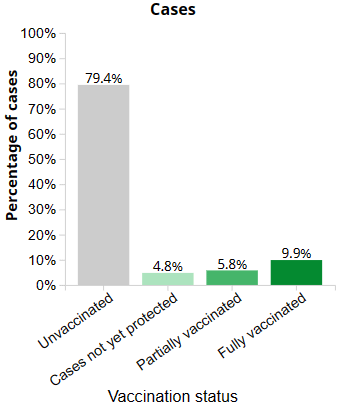
PURPOSE: The
COVID-19 pandemic now reaches over a year and a half leading to
long term illness and death. Vaccines were created and introduced
early in 2021 as an effort to control the spread of COVID. Despite
this nobel quest, data allegedly from UK Patient database reveals
unexpectedly that those who were vaccinated where more likely to
catch covid than those not-vaccinated! Scientific AmeriKen suspects
there is a scientific explanation for this phenomonenon other than
the possibilty that vaccinations actually make one more susceptible
to infection! HYPOTHESIS: Normalization more or less assumes the two groups, vaccinated and unvaccinated, are equivalent. Further, that the assumption is that both groups blend together - however, this may not be true as those that are vaccinated may be more likely to hang out others that are vaccinated and vice-versa. This may lead to a situation where an infected vaccinated person may be more likely to spread it to other vaccinated, thus might explain why even normalized data shows they are infected more often. Using marbles as the model - it is the hypothesis of this experiment that drawing from unmixed marbles will skew towards the majority compared to when drawing from well blended marbles. METHODOLOGY: To test this hypothesis, 100 marbles will be placed into a bin. Initially 50 striped "Cats-eye" marbles and 50 solid colored marbles will added and blended together. A handful will be grabbed and the marbles in hand counted and then normalized (a total of 20 trials). Next, the marbles will be used at 70 striped and 30 solid, as well as 80 striped and 20 solid. Initially, the marbles are added and blended together for 20 trials each. Then the marbles separated, initially striped marbles are added, then the solid marbles are added so that they stay together, and 20 more trials are performed. Differences were compared using a Student's T-Test, with significance being recognized at 0.05 or lower. RESULTS: Data represent the mean of 20 trials per condition. P-values represent statistical comparisons between Blended and unmixed marbles
Conclusion
and Discussion: These data suggest that leaving the marbles unmixed
resulted in the majority being picked more often. However, it is
important to note that - "statistically" - there was not
difference between the groups. Perhaps to reach statistical significance,
Scientific AmeriKen would have to repeat this experiment a hundred
times over - so since the mean fits the hypothesis, ScientificAmeriKen
will just call it a win. Although the source data raises the possibilty
that vaccines increase susceptibilty to catching COVID, these data
do not rule out that possibility - |

 Data pictured on right shows that total cases are
higher in the vaccinated vs unvaccinated - and additional data (which
can't be found but ScientificAmeriKen remembers seeing) further
revealed this difference held up when normalized to the number of
vaccinated/unvaccinated individuals. Normalization is important
since vaccinated outnumber unvaccinated at least 2-1, and normalizing
rules out the possibility that vaccinated people get covid more
often simply because there are more of them. Here, Scientific AmeriKen
will test another possibility using marbles.
Data pictured on right shows that total cases are
higher in the vaccinated vs unvaccinated - and additional data (which
can't be found but ScientificAmeriKen remembers seeing) further
revealed this difference held up when normalized to the number of
vaccinated/unvaccinated individuals. Normalization is important
since vaccinated outnumber unvaccinated at least 2-1, and normalizing
rules out the possibility that vaccinated people get covid more
often simply because there are more of them. Here, Scientific AmeriKen
will test another possibility using marbles.
 and in all in all, every possibility
should be explored scientifically. However, this work here raises
the possibilty that if more vaccinated people catch covid it could
be due to non-immune system possibilities, like who people opt to
hang out with, urban versus rural lifestyles, or maybe vaccine people
think they are invincible and thus take more chances.
and in all in all, every possibility
should be explored scientifically. However, this work here raises
the possibilty that if more vaccinated people catch covid it could
be due to non-immune system possibilities, like who people opt to
hang out with, urban versus rural lifestyles, or maybe vaccine people
think they are invincible and thus take more chances.